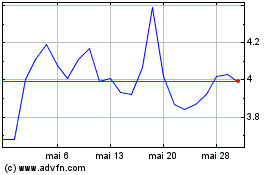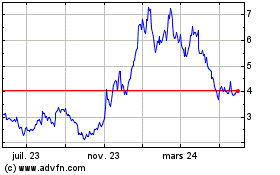Autolus Therapeutics announces publication in Blood Cancer Journal
11 Mars 2024 - 12:00PM

Autolus Therapeutics plc (Nasdaq: AUTL), a clinical-stage
biopharmaceutical company developing next-generation programmed T
cell therapies, today announced a publication in Blood Cancer
Journal entitled ‘Dual T-cell constant β chain (TRBC)1 and
TRBC2 staining for the identification of T-cell neoplasms by flow
cytometry.’ 1
Diagnosing leukemic T-cell malignancies poses
challenges due to their resemblance to reactive T-cells. In the
paper published by Pedro Horna of Mayo Clinic in collaboration with
Autolus, the authors introduce a unique approach for identifying
T-cell neoplasms by flow cytometry1. This method adopts the
recently described monoclonal antibodies targeting TRBC1 and
TRBC22, 3, to assess for TRBC-restriction as a surrogate of
clonality. The strategy mirrors the routine and broadly adopted
analysis of kappa and lambda immunoglobulin chain restriction for
the identification of B-cell malignancies.
This innovative and simple strategy to detect
clonal expansion of T-cells by flow cytometry has the potential to
facilitate the development of more comprehensive diagnostic panels
that can be seamlessly integrated into existing screening
protocols, obviating the need for separate T-cell clonality
assessments. Autolus is working with world leading flow cytometry
companies, including Beckman Coulter Life Sciences, BD (Becton,
Dickinson and Company) and Thermo Fisher Scientific, in order to
enable the development and distribution of diagnostic panels based
on these unique TRBC1 and TRBC2 antibodies.
Advancements in diagnostic approaches for T-cell
malignancies, coupled with the development of TRBC1 and
TRBC2-directed CAR T cell therapeutics4, may contribute to the
improvement of therapeutic strategies in this area of unmet
clinical need.
1. Horna et al, Dual T-cell constant β chain
(TRBC)1 and TRBC2 staining for the identification of T-cell
neoplasms by flow cytometry. Blood Cancer J. 14, 34 (2024). | doi:
10.1038/s41408-024-01002-0
2. Maciocia et al, Targeting the T cell receptor
β-chain constant region for immunotherapy of T cell malignancies.
Nat Med 23, 1416–1423 (2017) | doi: 10.1038/nm.4444
3. Ferrari et al, Structure-guided engineering
of immunotherapies targeting TRBC1 and TRBC2 in T cell
malignancies. Nat Commun 15, 1583 (2024) | doi:
10.1038/s41467-024-45854-3
4. Cwynarski et al, First in human study of
AUTO4, a TRBC1-Targeting CAR T cell therapy in refractory T cell
lymphoma. Hematol Oncol 41, 80–81 (2023) | doi:
10.1002/hon.3163_44
About Autolus Therapeutics
plc Autolus is a clinical-stage biopharmaceutical
company developing next-generation, programmed T cell therapies for
the treatment of cancer and autoimmune disease. Using a broad suite
of proprietary and modular T cell programming technologies, Autolus
is engineering precisely targeted, controlled and highly active T
cell therapies that are designed to better recognize target cells,
break down their defense mechanisms and eliminate these cells.
Autolus has a pipeline of product candidates in development for the
treatment of hematological malignancies, solid tumors and
autoimmune diseases. For more information, please visit
www.autolus.com.
Forward-Looking
Statements This press release contains
forward-looking statements within the meaning of the "safe harbor"
provisions of the Private Securities Litigation Reform Act of 1995.
Forward-looking statements are statements that are not historical
facts, and in some cases can be identified by terms such as "may,"
"will," "could," "expects," "plans," "anticipates," and "believes."
These statements include, but are not limited to, statements
regarding Autolus' development of its product candidates. Any
forward-looking statements are based on management's current views
and assumptions and involve risks and uncertainties that could
cause actual results, performance, or events to differ materially
from those expressed or implied in such statements. These risks and
uncertainties include, but are not limited to, the risks that
Autolus' preclinical or clinical programs do not advance or result
in approved products on a timely or cost effective basis or at all;
the results of early clinical trials are not always being
predictive of future results; the cost, timing and results of
clinical trials; that many product candidates do not become
approved drugs on a timely or cost effective basis or at all; the
ability to enroll patients in clinical trials; and possible safety
and efficacy concerns. For a discussion of other risks and
uncertainties, and other important factors, any of which could
cause Autolus' actual results to differ from those contained in the
forward-looking statements, see the section titled "Risk Factors"
in Autolus' Annual Report on Form 20-F filed with the Securities
and Exchange Commission, or the SEC, on March 7, 2023 and in
Autolus' Quarterly Report on Form 10-Q filed with the Securities
and Exchange Commission on November 9, 2023, as well as discussions
of potential risks, uncertainties, and other important factors in
Autolus' subsequent filings with the Securities and Exchange
Commission. All information in this press release is as of the date
of the release, and Autolus undertakes no obligation to publicly
update any forward-looking statement, whether as a result of new
information, future events, or otherwise, except as required by
law. You should, therefore, not rely on these forward-looking
statements as representing Autolus' views as of any date subsequent
to the date of this press release.
Contact:
Olivia Manser+44 (0) 7780 471
568o.manser@autolus.com
Julia Wilson+44 (0) 7818
430877j.wilson@autolus.com
Susan A. NoonanS.A. Noonan
Communications+1-917-513-5303susan@sanoonan.com
Autolus Therapeutics (NASDAQ:AUTL)
Graphique Historique de l'Action
De Jan 2025 à Fév 2025

Autolus Therapeutics (NASDAQ:AUTL)
Graphique Historique de l'Action
De Fév 2024 à Fév 2025


